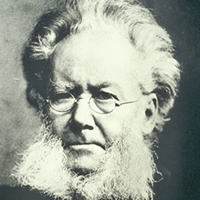Dramatic Irony in A Doll's House
Dramatic irony implies to the speech and action of a character that is guided by partial or utter misunderstanding of the reality. The character is not consciously using irony to satirize someone. Irony is realized from conscious or unconscious speeches or actions.

Henrik Ibsen (1828-1906)
The gap between the appearance and reality about Nora's apparently happy life, apparently loving husband, apparently safe and comfortable past and future, and many such appearances are ironical in this drama. There are many instances of irony in the play.
A Doll’s House is full of dramatic irony. For example, Nora expresses her happiness at the beginning of the play by saying that her husband is employed in a higher post and they need not to worry about their future. But, we see that all that was actually the expression of the hidden anxiety for the lack of money to pay off her debts to Krogstad. Nora has been poor. In fact, she is not so conscious of this reality. Ironically, all the troubles and sorrows of Nora begins with her husband promotion and her life is completely shattered at the end. She is unconscious about the future, and of course, we also do not know, that her expectation subsequently goes astray.
The situation when Helmer talks about the moral degradation of Krogstad is also ironical. Helmer explains that Krogstad had committed earlier a forgery and he was crooked by soul. He teaches Nora that she must not ask him to consider Krogstad’s case because such people contaminate their family and children with the influence of their guilt. Though Helmer is ignorant of the fact, Nora and readers come to know that, ironically, all his moral teachings were applicable to his own wife, Nora, who has also committed a similar crime of forgery.
It is also a case of dramatic irony when Helmer says that he will willingly sacrifice his happiness and dignity if some danger were to threaten his wife. But when such a thing happens in the next moment, he turns out to be a complete coward and an utterly egoistic person who will not sacrifice anything at all, in the name of a mere wife. The two dialogues from his own mouths will show the irony; one is his fanciful promise and the other is his response to the ensuing situation.
This is his promise: "Let what will happen, happen. When the real crisis comes, you will not find me lacking in strength or courage. I am man enough to bear the burden for us both."
And this is his response to reality: "How could it help if you were gone from his world? It wouldn't assist me.... I may easily be suspected of having been an accomplice in your crime. People may think... We must appear to be living together... But the children shall be taken out of your hands. I dare no longer entrust them to you."
Nora is unconscious while telling Mrs. Linde that her husband is passionately in love with her, and that he wants her all to himself. This also turns false because she comes to learn at the end that he is very selfish and opportunist. Helmer is not the same what he appears. He appears as a moralist, a teacher, a guardian, a master, a strong man, and so on, but he does not prove any one of them. He scorns Nora accusing and criticizing that she has inherited all bad conducts of her father. How can we attribute sacred moral virtues to him when he himself is ready to buy the blackmailer Krogstad by all his means.
There are many instances of irony, and one more of them is striking. Nora's remark to Helmer that everything he does is quite right is ironical. The speech is ironical because, in the light of what subsequently happens, this speech becomes utterly absurd. Soon it will appear that his much vaunted love for Nora is only a piece of hypocrisy and an illusion and that, more than anything else, he loves himself and the public image of himself.
At the time of rehearsal of the Tarantella, Helmer said to her that she is dancing wildly as if her life depended on the dancing. Nora responds ironically, that her life really does depend on it though Helmer does not understand what she means. Nora counts remaining hours of her life after the rehearsal because she thinks she would sacrifice herself before her husband would sacrifice for her. Both sacrifices never occur and the theme of the play is a twisted irony to the separation and uncertainty of life. Helmer’s “helpless little thing”, Nora, ironically becomes stronger, confident, independent and serious in life. Helmer’s so imagined possession, his little doll, his beautiful treasure becomes ironically a complete stranger to him.
A Doll's House Study Center
Signification of the Slamming of the Door in A Doll's House
Nora's Identity as a Person in A Doll's House
Parallelism and Contrast in A Doll's House
The Plot Construction in A Doll's House
A Doll's House Study Center
Introduction of A Doll's House
Detailed Summary of A Doll's House
Characterization of Mrs. Nora Helmer
A Doll's House as a Reformist Play
A Doll's House as A Feminist Play
A Doll's House as a Modern Tragedy
 |
bachelorandmaster.com |